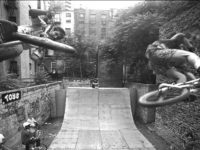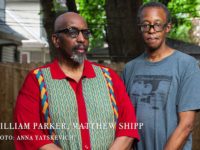feature photo: Glen Mordeci
Eri Yamamoto, Chad Fowler, William Parker and Steve Hirsh call the ardent sounds emanating from their instinctively-minded quartet “spontaneous folk music.”
Sparks is a studio capture of these four, highly individual players impulsively making what some might call a mixture of modern, avant-garde and free jazz, but the ‘folk’ description accurately speaks to the unpretentious nature of the music they made, one that strived for authentically portraying their souls than playing licks or riffs for the sake of, well, playing licks or riffs.
Having had an extensive classical background, Eri Yamamoto knows just how to bring that training into a seemingly unconnected music form. In fact, she often sounds liberated to not have to think ahead and just play what comes to her. And she manipulates space so well, it’s key to making these recordings never sounding like a cluttered mess. Steve Hirsh has had an interesting life journey and you can read it here, but safe to say, if he’s proficient enough to play with the likes of Shipp, Ivo Perelman, Steve Swell and George Cartwright, he can hang with these guys (and does he ever).
Chad Fowler’s saxophone distills the old firebrands of the ’60s – Coltrane, Sanders, Ayler, Shepp – while at the same time, as Shipp had noticed, “I hear a lot of Johnny Hodges in his playing.” But Fowler is a Southern R&B guy at heart, and given the R&B parallel with Albert Ayler, it’s really no surprise that Fowler came to free jazz from that starting point. Comparisons to Rahsaan Roland Kirk are also inevitable, too, since Fowler’s saxophones of choice is a straight Buescher alto and a saxello, which Kirk called a ‘stritch’ and a ‘manzello,’ respectively. In case you’re wondering, Fowler plays them one at a time ;-).
Bass eminence William Parker, who shows up in this space so frequently, needs no introduction here. You know he’s built for sessions like these.
Considering that all of the five tracks of Sparks are group improvisations and these are the first recordings of the four together, it’s sometimes astounding to hear the melodies that are being conjured up at the moment. If “Sparks,” the song, is free jazz, the four did a phenomenal job in disguising it as a, graceful, well-conceived chart. To be sure, the musician play without restriction, but are always moving purposely to a lovely strain, and doing so in concert.
“In The Garden” is the most accessible song in the batch, but that’s only because of its almost childlike hook, repeated often but often taken into the hinterlands as everyone is exploring every possible abstraction from this theme.
A catchy bass figure sets off “Bob’s Pink Cadillac” but Hirsch’s voluminous drums puts it into overdrive, and by the time Yamamoto makes her presence known, the song has settled into a wide orbit around the theme. Parker remains in the eye of the storm and about halfway through, he’s inventing a whole new melody for the others to build upon.
“Taiko” is an elegy where Fowler invests his soul into, blowing his horn as if he is telling a sad story, and then the storytelling is gently continued by Parker, followed by Yamamoto’s sweeping statements. Perhaps ironically, Fowler at one point breaks out “You Are My Sunshine.” From there, the four seek out new ways to move forward and inevitably fall into a new conversation.
“Real World” revolves around a dialogue between Fowler’s sax and Parker’s bow. Hirsh doesn’t keep time but produces a flow churning underneath and Yamamoto almost invisibly leads the group into a gallop, prompting Fowler to bolt outside. Then Yamamoto takes charge, putting down chords on a loosely defined strain that resides in that no-man’s land between tonal and atonal and all the freedom that comes from it. That carries over even when the songs shifts from volatility to tranquility.
Sparks is currently out, courtesy of Fowler’s Mahakala Music label. Purchase a copy from Bandcamp.
- Nick Millevoi – ‘Moon Pulses’ (2024) - April 23, 2024
- Cannonball Adderley – ‘Poppin’ in Paris: Live at L’Olympia 1972′ (2024) - April 20, 2024
- Christian Marien Quartett – ‘How Long Is Now’ (2024) - April 18, 2024




